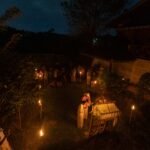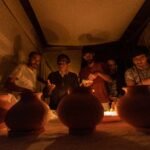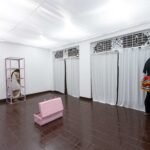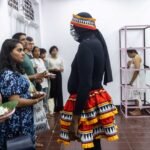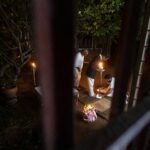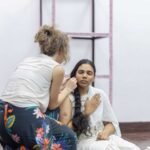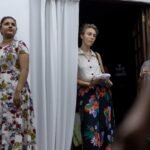Once Upon a Time, I was Addicted to You.
Loss of women’s identity due to Abuse and the creation of a Healing Ritual aimed at healing the resulting trauma.
March 24th, 25th, and 26th ,2023 @ SpaceEka Artists’ Residency, Maharagama
Inspiration for the Performance
“24.9% of women in Sri Lanka have experienced physical or sexual violence by a partner or a non-partner.”
- women's wellbeing survey 2019
COMMITTEE ON THE ELIMINATION OF DISCRIMINATION AGAINST WOMEN (CEDAW) by United Nation human rights office of the high commissioner in 1992, General Recommendation No. 19 elaborates that “It unequivocally brought violence outside of the private sphere and into the realm of human rights”. After 25 years in 2017, General recommendation No. 35 elaborates that “ It stresses the need to change social norms and stereotypes that support violence, in the context of a resurgence of narratives threatening the concept of gender equality in the name of culture, tradition or religion, and it recognizes that the prohibition of gender-based violence has become a norm of international customary law, it expands the understanding of violence to include violations of sexual and reproductive health rights, it emphasizes the need for approaches that promote and respect women’s autonomy and decision-making in all spheres of life.”
We have recognized that there are certain factors that promote violence against women. Some of those are the irresponsibleness of family members, lack of education regarding violence and sexual health, the desire for sex and money, workplace violations, public transportation and public travelling, and by being a housemaid, disabilities (physical and mental) in men and women, language barriers, multi-ethnic problems, social stigma, involvement of miners, and inadequate aid. The issues in Sri Lankan social situations such as diversity, equality, and inclusion also have a major impact towards the violence against women.
The inspiration to give much attention to this particular topic, violence against women, was the “Kahawaththa” rape and murder incident that happened in 2012 in Rathnapura district. Out of 6 murders police were able to find a motive only for 2 murder cases.
People were left behind not having clear answers. Some articles claimed that the killings started in 2008 and continued till 2015. This incident is only one of many.
We have gathered the information by qualitative and quantitative methods such as conducting interviews with officials working in law, participant observation of women helping centres, and collecting more data from the general public, newspapers, and the internet.
We know that worldwide many cases are occurring regarding abuse and violence against women. The reason why we, SpaceEka, focus on Sri Lankan society is that we are Sri Lankans and we believe we can be a powerful voice for these women. Therefore, we introduce this platform, “Performance” as a healing ritual after such traumatic incidents
According to the Sri Lankan women’s well-being survey, 56.5% agreed a good wife obeys her husband even if she disagrees. The mindset of the Sri Lankan people has to change, that’s why we try to openly discuss the topic of violence and abuse through performances. As it is the best weapon for an artist to fulfill their social responsibilities towards the community. Also with experience, we know that performance is one of the best ways to convey this message to the public.
Internationalization of the origin of the performance
The play ‘’Once Upon a Time, I was Addicted to You’’, was performed at the Dell’arte International School of Physical theatre Frame by Frame Theatre Festival in 2020, California, USA.
The play was devised and acted by SpaceEka residential artists. Namely, Veenadari Lakshika Jayakody and Jayampathi Guruge. After the original play, we took a break to do some deep-dive research on the topic which is discussed throughout the play, which is female abuse and the resulting loss of identity. The impact of that identity crisis can be, not only on women but on men and everyone in between. This leaves women struggling to answer the question of who they are as a person. As Sri Lankans we see that it is women who bear the brunt of abuse, on top of which they often get the blame for it as well. To make things worse, society makes sure the women keep hush about the incident that occurred to them. The proposed production aims to bring awareness to the topic of female abuse. What are the ways females get abused? By whom? What is the aftermath? SpaceEka, we strongly believe that our artistic project would send the message to society that women shouldn't be quiet about such abuse and there are various ways to seek help such as organizations, helplines, educational centres houses etc. As well as, we’ll be talking about the strength that a woman has to have, to rebuild her life after such dramatic events. Rather than tolerating or accepting violence in silence, we encourage women to speak up and seek help through our artwork. Therefore, we plan to tour our show locally and internationally. We would love to bring this issue of abuse towards women to the forefront internationally as well, because it’s not only Sri Lankan society that goes through such incidents. But also all South Asian cultures experience abuse and violence towards women.
Beings in a performative space
We are ready to share a new approach to art and life. And it will be a new experience for the artist and audience too. It’s going to be a moment for the creators and the audience to come together. A chance to understand that moment in which we are creating.
The Performance Once Upon a Time, I was Addicted to You, Contemporary Ritual is a culmination of ongoing research and performance labs on healing rituals for women who have lost their identity due to abuse and violence. This leaves women struggling to answer the question of who they are as a person and their healing journey after a traumatic incident.
As Sri Lankans, we see that it is women who bear the brunt of the abuse, on top of which they often get the blame for it as well. To make things worse, society makes sure the women keep hush about the incident that occurred to them. The production aims to bring awareness to the topic of female abuse. What are the ways females get abused? By whom? What is the aftermath?
Overall three performance labs were completed locally and Internationally from 2020 up to now.
The first performance lab was executed at the Dell’arte International School of Physical Theatre Frame by Frame Theatre Festival in 2020, California, USA. This lab’s focal point was to express healing through self-narration and repetitive everyday gestures. The physical theatre was the language used to perform the ritual. The performance lab was mentored by the former school director at Dell’arte International School of theatre, Lauren M Wilson and the current Artistic Director at the SpaceEka Artists’ Residency, Jayampathi Guruge.
The second performance lab was performed at SpaceEka Artists’ Residency Colombo, Sri Lanka in March 2023. The lab was focused on Traditional Ritual, Contemporary Performance, and Community Engagement towards the healing journey of women who lose their identity due to abuse and violence. A post-show discussion with the spectators and the performers followed the performance. The performance lab has been inspired by the Sri Lankan traditional healing ritual towards women such as “Riddi Yagaya”. It is a ritual which is performed to cure women who suffer from fertility complications.
The above performance lab was mentored by the current Artistic Director at the SpaceEka Artists’ Residency, Jayampathi Guruge and senior visual artist Prasad Aluthwaththa. The performance team and production team were combined with new and professional artists in the industry. Such as senior dance and drama artist Jithendra Vidyapathi, traditional dance practitioner Ruwan Pushpakumara, Theater writer and director Kasun Ukwaththa, Software engineer Ransaka Uththunga, and dance artist Nuwanthika Ranaweera.
The third performance lab took place in April 2023 at the Conflictorium Museum in Ahmedabad, India. The lab was named Ongoing- Undoing since healing is an ongoing process of what has to be undone. The performance lab had two significant components of personal ritual and public ritual. It started with a personal healing ritual and then gradually moved on to the public ritual by inviting the spectators to a part of the ritual.
The performance lab took palace due to a grant offered by the Goethe-Institute New Delhi in collaboration with the Conflictorium, which hosted a process-based laboratory titled Invisible Dance; The Body in Friction. Facilitated by Theatrer Garasi artists Arsita Iswardhani and Ugoran Prasad, Indonesia as well as a former Founder and Director at the Conflictorium Avni Sethi and Managing director at the Gati Dance Forum Mandeep Raikhy, India.
The next step for the Once Upon a Time I was Addicted to You – Contemporary Ritual will be to analyse all three lab performances and post-show discussions to build an actual ritual to bring it to future generations. There is a strong result of the research so far, which is Humanity is the greatest gift and still remains up to date when it comes to healing.
As well as there are more factors that provoke abuse and violence to wards women in Sri Lanka. Some of those are the irresponsibleness of family members, lack of education regarding violence and sexual health, the desire for sex and money, workplace violations, public transportation and public travelling, and by being a housemaid, disabilities (physical and mental) in men and women, language barriers, multi-ethnic problems, social stigma, involvement of miners, and inadequate aid. The issues in Sri Lankan social situations such as diversity, equality, and inclusion also have a major impact towards the violence against women.
Through this production, there is a strong belief that Once Upon a Time I was Addicted to You- Contemporary Ritual, would send the message to society that women shouldn’t be quiet about such abuse and there are various ways to seek help such as organizations, helplines, educational centres houses etc. As well as, we’ll be talking about the strength that a woman has to have, to rebuild her life after such dramatic events. Rather than tolerating or accepting violence in silence, we encourage women to speak up and seek help through our artwork.
Goals and Objectives
- To create community awareness.
- Community-wise programme on gender discrimination awareness.
- To develop centres and organizations where people can get help.
- Make policy recommendations to the government sectors.
- Introduce advocacy centres.
- Translating written materials about sexual health which are mostly written in English into other important languages including Sinhala, Tamil, Sign Language and Braille Printing.
- To develop support and bring equalization in opportunity in the community.
- The audience has an opportunity to join as a character and give their opinion on violence towards women.
- Hand over leaflets with organization and contact information about help centres.
- Post-show focus group discussions with an advocate.
- Teach the audience the use of performance to release their stress due to violence.
- Travel to rural areas to perform and educate people about abuse, and how to deal with it.
- Sustainable development; publication, post-show survey.
- Ongoing in-service -training artists to communicate with women with issues.



